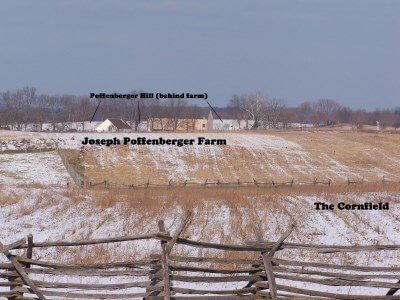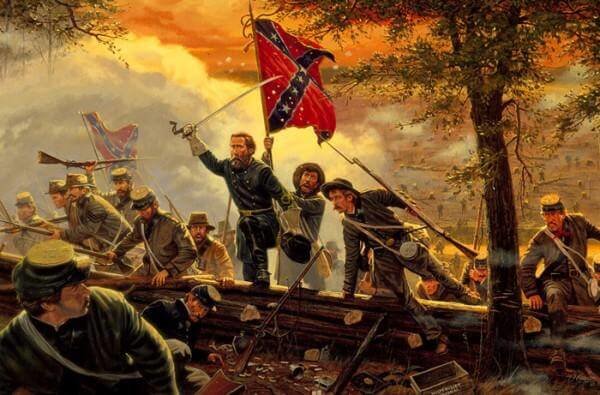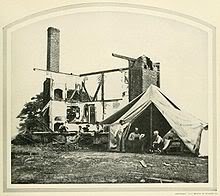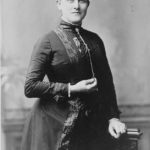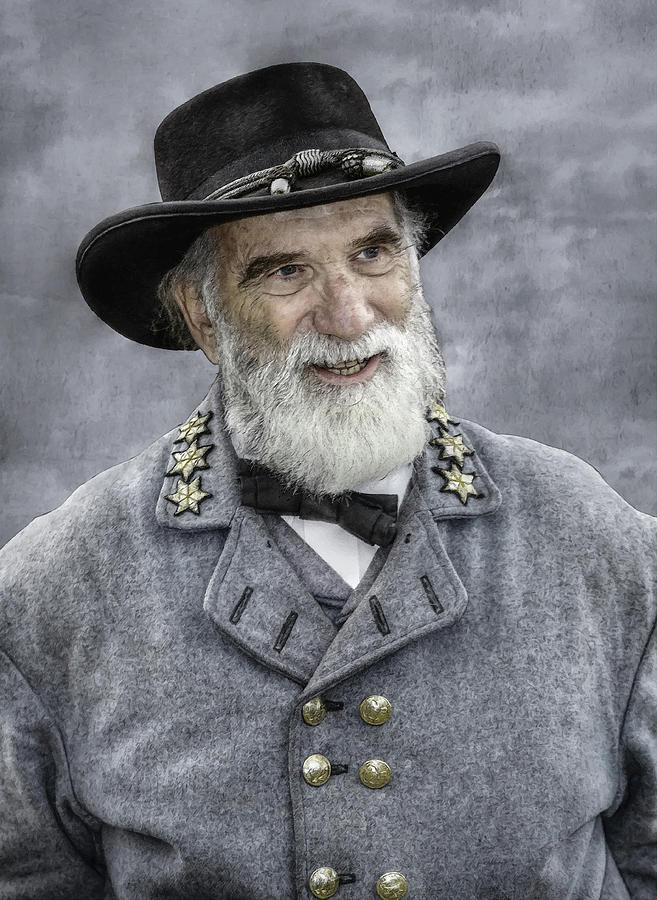Mary Bedinger Mitchell was born August 3, 1850. Her father, Henry Bedinger, served as America’s first ambassador to Denmark. In 1858, the family went to Shepherdstown, Virginia (now West Virginia), where Henry had grown up. In the 1840s, he came down with pneumonia after giving a speech to a cheering crowd. He died two weeks later.

Mary Bedinger Mitchell
The family lived for a while with her father’s sister, Henrietta Bedinger Lee, and her husband, Edmund Jennings Lee, the first cousin of Robert E. Lee. In 1859, Mary’s mother bought “Poplar Grove,” near Shepherdstown and had an addition built onto the house. She also hired a tutor to teach her children at home.
After the Battle of Antietam, which occurred on September 17, 1862, Union forces attempted to pursue Lee’s retreating army. Fitz John Porter ordered the First U.S. Sharpshooters forward, and they began to pick off Confederate gunners on the far side of the river. Some Union artillery shells crashed into Shepherdstown itself, causing confusion and chaos among the townspeople and wounded Rebels left there.
Just before dark, a Union attacking party of about 500 men waded across under the cover of a barrage of fire, and forced the Confederate infantry back. The Southerners managed to pull most of their cannon out, but the raiding party was able to capture five pieces.
The Yankees pulled back to the east side of the river for the night. In the confusion and darkness, Pendleton reported to Lee that Union forces were in Virginia and had captured the entire reserve artillery. Lee and General Stonewall Jackson reacted by directing A. P. Hill’s and Jubal Early’s Divisions to turn back and drive the pursuers back into Maryland.
Three brigades from the 5th Corps of the Union Army crossed the Potomac at 7:00 a.m. the following morning, and proceeded toward Shepherdstown. Their advance skirmishers soon met A. P. Hill‘s Division closing in on the ford from the west. Porter then ordered all Union troops to cross the river back into Maryland.
Mary Bedinger Mitchell later wrote a famous essay about her experiences during those days of suffering and loss, called A Woman’s Recollections of Antietam. It appears in Volume II of Battles and Leaders, by Johnson and Buel.
These are excerpts from that piece:
We had passed an exciting summer. Winchester had changed hands more than once; we had been ‘in the Confederacy’ and out of it again, and were now waiting for the next move in the great game. It was a saying with us that Shepherdstown was just nine miles from everywhere. It was, in fact, about that distance from Martinsburg and Harper’s Ferry and from Williamsport, where the armies so often crossed, both to and from Maryland. What was more important was that a turnpike road led in almost a straight line for thirty miles to Winchester on the south, and stretched northward beyond the Potomac another twenty miles.
In this odd little borough, then, we were waiting ‘developments,’ hearing first that ‘our men’ were coming, and then that they were not coming, when suddenly, on Saturday, the 13th of September, early in the morning, we found ourselves surrounded by a hungry horde of lean and dusty tatterdemalions [men wearing worn or tattered clothing], who seemed to rise from the ground at our feet. All day they crowded to the doors of our houses, begging for food. We went to get what we had. They could be seen afterward asleep in every fence corner, and under every tree, but after a night’s rest they “pulled themselves together” somehow and disappeared as suddenly as they had come.
I know nothing of numbers, nor what force was or was not engaged in any battle, but I saw the troops march past us every summer for four years, and I know something of the appearance of a marching army, both Union and Southern. There are always stragglers, of course, but never before or after did I see anything comparable to the demoralized state of the Confederates at this time. Never were want and exhaustion more visibly put before my eyes, and that they could march or fight at all seemed incredible.
As I remember the next morning – it was Sunday, September 14th – we were awakened by heavy firing at two points on the mountains. We knew almost nothing except that there was fighting, that it must be very heavy, and that our friends were surely in it somewhere, but whether at South Mountain or Harper’s Ferry we had no means of discovering…how we staid at the windows until we could not endure the suspense; how we walked about and came back to them; and how finally, when night fell, it seemed cruel and preposterous to go to bed still ignorant of the result.
The Battles of South Mountain and Crampton’s Gap were fought nearby on Sunday, September 14, 1862, resulting in the stream of wounded that flooded Shepherdstown the following day.
Monday afternoon [the 15th], about 2 or 3 o’clock, when we were sitting about in disconsolate fashion, distracted by the contradictory rumors, our Negro cook rushed into the room with eyes shining and face working with excitement. She had been down in “de ten-acre lot to pick a few years of cawn,” and she had seen a long train of wagons coming up from the ford, and “dey is full of wounded men, and de blood running outen dem dat deep,” measuring on her outstretched arm to the shoulder.
This horrible picture sent us flying to town, where we found the streets already crowded, the people all astir, and the foremost wagons, of what seemed an endless line, discharging their piteous burdens. The scene speedily became ghastly, but fortunately we could not stay, there were no preparations, no accommodations – the men could not be left in the street – what was to be done?
The first thing was to find roofs to cover them. Men ran for keys and opened the shops long empty, and the unused rooms; other people got brooms and stirred up the dust of ages; then swarms of children began to appear with bundles of hay and straw, taken from anybody’s stable. These were hastily disposed in heaps, and covered with blankets – the soldiers’ own, or blankets begged or borrowed. On these improvised beds the sufferers were placed, and the next question was how properly to dress their wounds. No surgeons were to be seen.
A few men, detailed as nurses, had come, but they were incompetent, of course. Our women set bravely to work and washed away the blood or stanched it as well as they could, where the jolting of the long rough ride had disarranged the hasty binding done upon the battlefield. But what did they know of wounds beyond a cut finger, or a boil? Yet they bandaged and bathed, with a devotion that went far to make up for their inexperience.
Then there was the hunt for bandages. Every housekeeper ransacked her stores and brought forth things new and old. I saw one girl, in despair for a strip of cloth, look about helplessly, and then rip off the hem of her white petticoat. The doctors came up, by and by, or I suppose they did, for some amputating was done – rough surgery, you may be sure. The women helped, holding the instruments and the basins, and trying to soothe or strengthen. They stood to their work nobly; the emergency brought out all their strength to meet it.
One girl who had been working very hard helping the men on the sidewalks, and dressing wounds afterward in a close, hot room, told me that at one time the sights so overcame her that she could only stagger to the staircase, where she hung, half conscious, over the banisters, saying to herself, “Oh, I hope if I faint some one will kick me into a corner and let me lie there!” She did not faint, but went back to her work in a few moments, even children did their part.
It became a grave question how to feed so many unexpected guests. The news spread rapidly, and the people from the country neighborhoods came pouring in to help, expecting to stay with friends who had already given up every spare bed and every inch of room where beds could be put up. Virginia houses are very elastic, but ours were strained to their utmost. Fortunately some of the farmers’ wives had been thoughtful enough to bring supplies of linen, and some bread and fruit, and when our wants became better known other contributions flowed in; but when all was done it was not enough.
The work continued the following day:
We worked far into the night that Monday, went to bed late, and rose early next morning. Tuesday, the 16th, brought fresh wagon-loads of wounded, and would have brought despair, except that they were accompanied by an apology for a commissariat. Soon more reliable sources of supply were organized among our country friends.
Some doctors also arrived, who – with a few honorable exceptions – might as well have staid away. The remembrance of that worthless body of officials stirs me to wrath. Two or three worked conscientiously and hard, and they did all the medical work, except what was done by our own town physicians.
In strong contrast was the conduct of the common men detailed as nurses. They were as gentle as they knew how to be, and very obliging and untiring. Of course they were uncouth and often rough, but with the wounded dying about us every day, and with the necessity that we were under for the first few days, of removing those who died at once that others not yet quite dead might take their places, there was no time to be fastidious; it required all our efforts to be simply decent, and we sometimes failed in that.
As night drew nearer, whispers of a great battle to be fought the next day grew louder, and we shuddered at the prospect, for battles had come to mean to us, as they never had before, blood, wounds, and death.
As if Shepherdstown was not already overrun with wounded soldiers, the bloodiest single day of fighting in the entire war, the Battle of Antietam, occurred a few miles away on September 17, 1862.
On the 17th of September [Wednesday], cloudy skies looked down upon the two armies facing each other on the fields of Maryland. It seems to me now that the roar of that day began with the light, and all through its long and dragging hours its thunder formed a background to our pain and terror. If we had been in doubt as to our friends’ whereabouts on Sunday, there was no room for doubt now.
We went about our work with pale faces and trembling hands, yet trying to appear composed for the sake of our patients, who were much excited. We could hear the incessant explosions of artillery, the shrieking whistles of the shells, and the sharper, deadlier, more thrilling roll of musketry; while every now and then the echo of some charging cheer would come, borne by the wind, and as the human voice pierced that demoniacal clangor we would catch our breath and listen, and try not to sob, and turn back to the forlorn hospitals, to the suffering at our feet and before our eyes, while imagination fainted at thought of those other scenes hidden from us beyond the Potomac.
On our side of the river [the Potomac] there were noise, confusion, dust; throngs of stragglers; horsemen galloping about; wagons blocking each other, and teamsters wrangling; and a continued din of shouting, swearing, and rumbling, in the midst of which men were dying, fresh wounded arriving, surgeons amputating limbs and dressing wounds, women going in and out with bandages, lint, medicines, food. An ever-present sense of anguish, dream, pity, and, I fear, hatred – these are my recollections of Antietam.
When night came we could still hear the sullen guns and hoarse, indefinite murmurs that succeeded the day’s turmoil. That night was dark and lowering and the air heavy and dull. Across the river innumerable campfires were blazing, and we could but too well imagine the scenes that they were lighting. We sat in silence, looking into each other’s tired faces. There were no impatient words, few tears; only silence, and a drawing close together, as if for comfort. We were almost hopeless, yet clung with desperation to the thought that we were hoping. But in our hearts we could not believe that anything human could have escaped from that appalling fire.
September 18, 1862:
On Thursday, the two armies lay idly facing each other, but we could not be idle. The wounded continued to arrive until the town was quite unable to hold all the disabled and suffering. They filled every building and overflowed into the country round, into farm-houses, barns, corn-cribs, cabins – wherever four walls and a roof were found together. Those able to travel were sent on to Winchester and other towns back from the river, but their departure seemed to make no appreciable difference.
Thursday night we heard more than usual sounds of disturbance and movement, and in the morning we found the Confederate army in full retreat. General Lee crossed the Potomac under cover of the darkness, and when the day broke the greater part of his force—or the more orderly portion of it—had gone on toward Kearneysville and Leetown.
The Battle of Shepherdstown took place on September 19-20, 1862, after General Robert E. Lee’s army began crossing the Potomac River back into Virginia at Blackford’s Ford, less than a mile downstream from Shepherdstown. The highway bridge at Shepherdstown had been destroyed early in the war, and that ford was a popular crossing point between Virginia and Maryland.
September 19, 1862:
General George B. McClellan followed to the river, and without crossing got a battery in position on Douglas’ Hill, and began to shell the retreating army and, in consequence, the town. What before was confusion grew worse; the retreat became a stampede. The battery may not have done a very great deal of execution, but it made a fearful noise. It is curious how much louder guns sound when they are pointed at you than when turned the other way!
It would have been ludicrous had it not produced so much suffering. The danger was less than it seemed, for McClellan, after all, was not bombarding the town, but the army, and most of the shells flew over us and exploded in the fields; but aim cannot be always sure, and enough shells fell short to convince the terrified citizens that their homes were about to be battered down over their ears.
The better people [?] kept some outward coolness, with perhaps a feeling of ‘noblesse oblige,’ but the poorer classes acted as if the town were already in a blaze, and rushed from their houses with their families and household goods to make their way into the country. The road was thronged, the streets blocked; men were vociferating, women crying, children screaming; wagons, ambulances, guns, caissons’ horsemen, footmen, all mingled and jammed together, in one struggling, shouting mass.
The Negroes were the worst, and with faces of a ghastly ash-color and staring eyes, they swarmed into the fields, carrying their babies, their clothes, their pots and kettles, fleeing from the wrath behind them. They fled widely and camped out of range, nor would they venture back for days.
Had this been all, we could afford to laugh now, but there was another side to the picture that lent it an intensely painful aspect. It was the hurrying crowds of wounded. Ah me! those maimed and bleeding fugitives! When the firing commenced the hospitals began to empty. All who were able to pull one foot after another, or could bribe or beg comrades to carry them, left in haste. In vain we implored them to stay; in vain we showed them the folly, the suicide, of the attempt; in vain we argued, cajoled, threatened, ridiculed; pointed out that we were remaining and that there was less danger here than on the road.
There is no sense or reason in a panic. The cannon were bellowing upon Douglas’ Hill, the shells whistling and shrieking, the air full of shouts and cries; we had to scream to make ourselves heard. The men replied that the ‘Yankees’ were crossing; that the town was to be burned; that we could not be made prisoners, but they could; that, anyhow, they were going as far as they could walk, or be carried. And go they did.
Men with cloths about their heads went hatless in the sun, men with cloths about their feet limped shoeless on the stony road; men with arms in slings, without arms, with one leg, with bandaged sides and backs; men in ambulances, wagons, carts, wheelbarrows, men carried on stretchers or supported on the shoulder of some self-denying comrade – all who could crawl went, and went to almost certain death.
They could not go far, they dropped off into the country houses, where they were received with as much kindness as it was possible to ask her; but their wounds had become inflamed, their frames were weakened by fright and overexertion: erysipelas, mortification, gangrene set in; and long rows of nameless graves still bear witness to the results.
Our hospitals did not remain empty. It was but a portion who could get off in any manner, and their places were soon taken by others, who had remained nearer the battlefield, had attempted to follow the retreat, but, having reached Shepherdstown, could go no farther. We had plenty to do, but all that day we went about with hearts bursting with rage and shame, and breaking with pity and grief for the needless, needless waste of life.
I have said that there was less danger than appeared, but it must not be supposed that there was none. A friend who worked chiefly in the old blue factory [then serving as another hospital] had asked me to bring her a bowl of gruel that some one had promised to make for one of her patients.
I had just taken it to her, and she was walking across the floor with the bowl in her hands, when a shell crashed through a corner of the wall and passed out at the opposite end of the building, shaking the rookery to its foundations, filling the room With dust and plaster, and throwing her upon her knees to the floor. The wounded screamed, and had they not been entirely unable to move, not a man would have been left in the building. But it was found that no one was hurt, and things proceeded as before.
September 20, 1862:
On Saturday morning there was a fight at the ford. The Negroes were still encamped in the fields, though some, finding that the town was yet standing, ventured back on various errands during the day. What we feared were the stragglers and hangers-on and nondescripts that circle round an army like the great buzzards we shuddered to see wheeling silently over us. The people were still excited, anticipating the Federal crossing and dreading a repetition of the bombardment or an encounter in the streets.
About noon, or a little after, we were told that General McClellan’s advance had been checked, and that it was not believed he would attempt to cross the river at once—a surmise that proved to be correct. The country grew more composed. General Lee lay near Leetown, some seven miles south of us, and General McClellan rested quietly in Maryland.
September 21, 1862:
On Sunday we were able to have some short church services for our wounded, cut still shorter, I regret to say, by reports that the ‘Yankees’ were crossing. Such reports continued to harass us, especially as we feared the capture of our friends, who would often ride down to see us during the day, but who seldom ventured to spend a night so near the river.
We presently passed into debatable land, when we were in the Confederacy in the morning, in the Union after dinner, and on neutral ground at night. We lived through a disturbed and eventful autumn, subject to continual ‘alarms and excursions,’ but when this Saturday came to an end, the most trying and tempestuous week of the war for Shepherdstown was over.
What an exceptional woman! That she had the presence of mind and memory to give us such a telling account of what was certainly one of the most traumatic experiences of her life.

